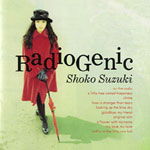 RadioGenic
RadioGenic
6th Album
Epic/Sony ESCB-1444
Released 11.1.1993
Track listing
- Radio no Youni (words: Masumi Kawamura/music: Shoko Suzuki)
- Koufuku no Ki (words: Masumi Kawamura/music: Shoko Suzuki)
- Chime (words: Mariko Okabe/music: Shoko Suzuki)
- Tokimeki wa Namida ni Makenai (words: Masumi Kawamura/music: Shoko Suzuki)
- Sora no Kyuuka (words: Masumi Kawamura/music: Shoko Suzuki)
- Goodbye, My Friend (words: Yuki Kajiura/music: Shoko Suzuki)
- Original Aim (words & music: Corey Hart)
- Ryoute Ippai (words: Mariko Okabe/music: Shoko Suzuki)
- My love, my love (words: Mariko Okabe/music: Shoko Suzuki)
- Yasashii Ame (words: Kyoko Koizumi/music: Shoko Suzuki)
Shoko's sixth album, and probably one where the story behind the recording overshadows the album itself. In the liner notes to the Life,/Music & Love DVD Shoko wrote about how Epic/Sony executives, in contrast to the more personal Hourglass, requested a bright pop album. The sessions were by all accounts hellish, with Shoko lamenting the inordinate number of takes and re-takes each song required -- indeed, the album took an astounding 11 months to finish. Matters were not helped when Shoko lost her voice in the middle of the recording sessions, contributing to the already troubled situation -- Shoko even says Epic/Sony blacklisted her over the endless sessions for the album. Always a perfectionist, and one to push herself in the studio -- again, in the notes for Life,/Music & Love Shoko notes how high-paced and stressful recording sessions for Mizu no Kanmuri (where her weight dropped to 86 lbs.) and Long, Long Way Home (high stress caused by recording two albums in one year) had been -- Shoko seriously began contemplating retiring from the music industry as a result of the chaos surrounding RadioGenic. It was only through the efforts of Epic/Sony A&R director Takeshi Namura that she did not go through with this -- he convinced her to keep going, and ended up playing a major part in Shoko's musical career over the next five-plus years. It is ironic, then, that in the end RadioGenic earned Shoko her highest placement ever in the Oricon record charts -- it peaked at #18, nearly 15 places higher than her next-highest charting album. It was also around this time that Shoko had her biggest hit as a songwriter. During the recording of the album she offered the song "Yasashii Ame" to Kyoko Koizumi; when Koizumi's version of the song was released as a single in Feburary 1993, it hit #2 on the Oricon singles chart and stayed in the chart for 15 weeks overall.
But what of the album itself? It starts off with the single "Radio no Youni," one of the only rock songs on the record (and one that Shoko herself would revist 12 years later), and probably the album's best track (though it was apparently one of the songs subjected to numerous retakes -- the finished version came about after Hirokai Sugawara got involved). True to Epic/Sony's demands, the rest of the album is often poppy, with only a couple of slower ballads (including a self-cover of "Yasashii Ame," yet another song subjected to re-takes -- the first released version is similar to Kyoko Koizumi's arrangement, whereas the version on this album has only sparse acoustic guitar accompaniment) . Also featured is a duet with Canadian pop singer Corey Hart, best known for his 1983 hit "Sunglasses at Night," on "Original Aim." I'm not sure what the story behind that is, but I wonder if it was another Epic/Sony idea to boost sales. In the end, despite some truly excellent songs, RadioGenic seems like a small step back, especially after the large step forward that Hourglass had been for Shoko as an artist. On the other hand, its success -- and the trials surrounding its recording -- ended up giving Shoko the artistic freedom and fortitude to make the records she wanted to make.
This album is out of print on its own, but is available in its entirety on the SHO-CO-SONGS collection 2 set.
Favorite songs:
Radio no Youni
Tokimeki wa Namida ni Makenai
Goodbye, My Friend
Yasashii Ame
Credits:
Shoko Suzuki: vocals, background vocals, piano, drums, hi-hat, cymbals, synthesizers, chime
Hiroaki Sugawara: acoustic guitar, bass, Fender Rhodes, synthesizers, background vocals
Satoshi Kadokura: piano, synthesizers, horn arrangement, string arrangment
Corey Hart: vocals
Akira Nishimoto: piano
Hirokazu Ogura: electric guitar, acoustic guitar
Yoshiyuki Sahashi: electric guitar, acoustic guitar
Tokuo Nakano: electric guitar
Hiroshi Tamaki: electric guitar solo on "Radio no Youni"
Hiroki Komazawa: pedal steel guitar
Chuei Yoshikawa: acoustic guitar
Takamune Nigishi: bass
Chiharu Mikuzuki: bass
Bakabon Suzuki: bass
Akira Asada: bass
Masafumi Minato: drums
Jun Aoyama: drums
Akio Noguchi: drums
Yoshikazu Satomura: percussion
Motoya Hamaguchi: percussion
Yasuo Kimoto: computer programming
Nobuo Yagi: harmonica
Masato Honda: soprano saxophone, alto saxophone
Junko Hirotani: background vocals
Raji: background vocals
Solid Brass: horns
Asuka Kaneko Group: strings
Arranged by Hiroaki Sugawara (M-1, 5)
Satoshi Kadokura (M-2, 3, 4, 7)
Hiroaki Sugawara and Shoko Suzuki (M-8, 9)
Shoko Suzuki and Chuei Yoshikawa (M-10)
Basic tracks arranged by Satoshi Kadokura (M-1, 9)

